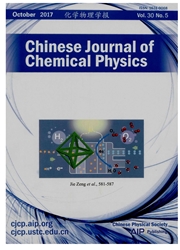

 中文摘要:
中文摘要:
采用水热法合成了纳米棒状La(OH)3载体,通过湿式浸渍方法制备了10%Ni/La(Ⅲ)负载型催化剂,考察了500~800℃不同焙烧温度对于催化剂氢解山梨醇制备低碳二元醇的影响,结合XRD、SEM/EDS、BET、H2-TPR-M S、CO/CO2-TPDM S、TG和ICP-AES等表征手段对Ni/La(Ⅲ)催化剂的构效关系进行了分析。结果表明,Ni/La(Ⅲ)催化剂表现出高的氢解反应活性,在较低的焙烧温度下(500℃)催化剂主要以Ni O/La2O2CO3结构形式存在。随着焙烧温度的升高,Ni O/La2O2CO3逐渐向La2Ni O4-La2O3进行转变。碱性是影响不同催化剂活性的决定因素,高的焙烧温度促进了催化剂中强碱性位的生成,显著提高了氢解反应活性,但对液体产物的选择性无明显影响,在220℃、4 MPa H2、1.5 h的条件下,山梨醇完全转化,低碳二元醇的产率可达到53%。低的焙烧温度则增加了催化剂的水热稳定性。催化剂的失活主要归结于活性金属粒子在水相反应中从载体表面脱落而发生团聚,降低氢解反应活性。
 英文摘要:
英文摘要:
Nanorod-shaped La( OH)3support was prepared by hydrothermal method,over which the supported Ni / La( III) catalysts were obtained through wet impregnation method; the influence of calcination temperature on the performance of Ni / La( III) catalyst in the hydrogenolysis of sorbitol to low-carbon glycols was then investigated by means of XRD,SEM/ EDS,BET,H2-TPR-MS,CO / CO2-TPD-MS,ICP-AES and TG. The results revealed that the Ni / La( III) catalysts are highly active for sorbitol hydrogenolysis; the yield of low-carbon glycols reaches 53% after reaction at 220 ℃ and 4 MPa H2 for 1. 5 h. The catalyst calcined at lowtemperature( 500 ℃) is mainly in the form of Ni O / La2O2CO3,which may transform into La2 Ni O4-La2O3 with the increase of calcination temperature. The basicity is a crucial factor for the hydrogenolysis activity; high calcionation temperature may enhance the basicity of the catalysts and then improve their hydrogenolysis activity,whereas the calcination temperature has little effect on the products selectivity. However,Ni O / La2O2CO3 exhibits better hydrothermal stability than La2 Ni O4-La2O3 for sorbitol hydrogenolysis. The deactivation of catalysts can be attributed to the separation of active Ni particles from the support and the agglomeration of the active species,which may reduce the amount of the active metal sites and destroy the catalyst structure.
 同期刊论文项目
同期刊论文项目
 同项目期刊论文
同项目期刊论文
 Synthesis of Fe3O4-nanocatalysts with different morphologies and its promotion on shifting C-5(+) hy
Synthesis of Fe3O4-nanocatalysts with different morphologies and its promotion on shifting C-5(+) hy Design of Multiple Metal Doped Ni Based Catalyst for Hydrogen Generation from Bio-oil Reforming at M
Design of Multiple Metal Doped Ni Based Catalyst for Hydrogen Generation from Bio-oil Reforming at M Hydrogenolysis of methyl heptanoate over Co based catalysts:Mediation of support property on activit
Hydrogenolysis of methyl heptanoate over Co based catalysts:Mediation of support property on activit Promoting Hydrolytic Hydrogenation of Cellulose to Sugar Alcohols by Mixed Ball Milling of Cellulose
Promoting Hydrolytic Hydrogenation of Cellulose to Sugar Alcohols by Mixed Ball Milling of Cellulose Conversion of cellulose to 5-hydroxymethylfurfural in water-tetrahydrofuran mixture and byproducts i
Conversion of cellulose to 5-hydroxymethylfurfural in water-tetrahydrofuran mixture and byproducts i Preparation of copper-iron bio-model pore catalyst and its performance for higher alcohols synthesis
Preparation of copper-iron bio-model pore catalyst and its performance for higher alcohols synthesis One-step hydrodeoxygenation of palm oil to isomerized hydrocarbonfuels over Ni supported on nano-siz
One-step hydrodeoxygenation of palm oil to isomerized hydrocarbonfuels over Ni supported on nano-siz Carbon Nanofibers-Supported Ni Catalyst for Hydrogen Production from Bio-Oil through Low-Temperature
Carbon Nanofibers-Supported Ni Catalyst for Hydrogen Production from Bio-Oil through Low-Temperature Direct degradation of cellulose to 5-hydroxymethylfurfural in hot compressed steam with inorganic ac
Direct degradation of cellulose to 5-hydroxymethylfurfural in hot compressed steam with inorganic ac Nitrate Combustion Methods to Prepare Highly-Active Cu/ZnO Catalysts for Low-Temperature Methanol Sy
Nitrate Combustion Methods to Prepare Highly-Active Cu/ZnO Catalysts for Low-Temperature Methanol Sy Production of light olefins by catalytic conversion of lignocellulosic biomass with HZSM-5 zeolite i
Production of light olefins by catalytic conversion of lignocellulosic biomass with HZSM-5 zeolite i Enhancing the productivity of microalgae cultivated in wastewater toward biofuel production: A criti
Enhancing the productivity of microalgae cultivated in wastewater toward biofuel production: A criti Tandem catalytic synthesis of light isoparaffin from syngas via Fischer-Tropsch synthesis by newly d
Tandem catalytic synthesis of light isoparaffin from syngas via Fischer-Tropsch synthesis by newly d Direct conversion of liquid natural gas (LNG) to syngas and ethylene using non-equilibrium pulsed di
Direct conversion of liquid natural gas (LNG) to syngas and ethylene using non-equilibrium pulsed di 期刊信息
期刊信息
